Why are otters raiding urban garden ponds?
"It is definitely otters because I've seen them. I've even chased one around the garden."
Nige Cooper loves animals. From the rescued fish in his garden pond to the visiting otters who are having to roam further to find food.
And the chihuahuas he has trained to act as an early warning system.
He is one of a number of pond owners in Ulverston, Cumbria, seeking humane ways to protect their fish from hungry mammals which, according to conservationists, are being forced to hunt in urban areas due to man-made environmental changes.
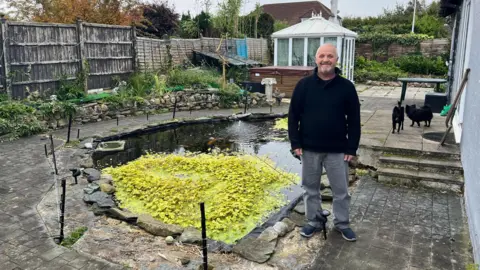 NIGE COOPER
NIGE COOPERThe 16ft-long pond in Nige Cooper's garden is where he dotes on his sturgeon, goldfish and rescued koi carp and delights in the dragonflies, bats and birds that dart above the water.
But he now watches over it for different reasons.
Nige is on high alert for otters who, he said, have snuck into his garden several times seeking a midnight snack.
"We've installed electric fences, motion-sensor lighting, left peppercorns and put up CCTV," the 61-year-old said.
"I've even trained my chihuahuas to look at the pond and bark like mad when they come."
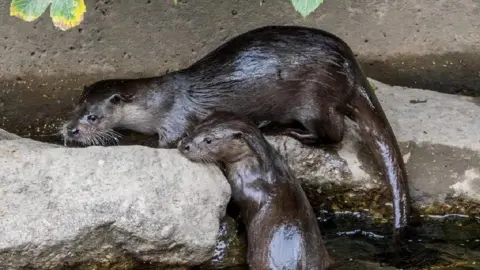 JONNY GIOS
JONNY GIOSNige says he "loves otters to bits", which is why he has gone to such efforts to try to safely deter them from snatching his fish.
"We could put wired chicken mesh over the pond, but it looks unattractive and would put off creatures like dragonflies and bats.
"We are lucky in that only about eight of our fish have been eaten and most of mine were rescues or donated.
"Other people have thousands of pounds worth of fish that are getting eaten."
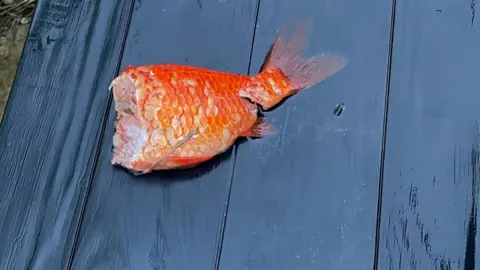 NIGE COOPER
NIGE COOPERAlong with a friend, Nige has been logging pond raids in his neighbourhood.
"We've had about 41 that have been recorded in Ulverston over the past six months," he said.
"There's a guy living down the road who bred his fish from babies 25 years ago, and the next morning there were just fish carcasses left... they'd wiped the lot out.
"I also spoke to a lady the other day who burst into tears because she lost 20 fish that she had for about 15 years."
His research has a wider purpose, he explained: "I just want pond owners to make sure they use the correct methods of deterrents.
"It is so lovely to see otters, but my question is why are they coming into urban areas for food?"
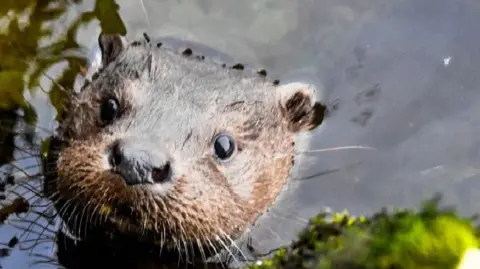 ROBERT WIGHT
ROBERT WIGHTUlverston is situated next to the River Leven and is home to a canal and several becks.
South Cumbria Rivers Trust (SCRT) said pollution and loss of habitat were linked to a decline of native fish, increasing the chance of otters predating on captive populations.
"The Ulverston catchment, like many others, has been modified by human activity over many years," SCRT's project officer Hannah Teagle said.
"There are a number of redundant structures, some of which are impassable to fish and other aquatic species."
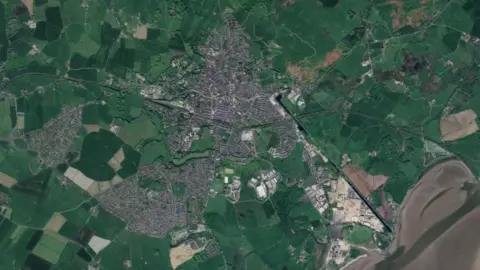 GOOGLE
GOOGLEThe trust said it was working with partners and landowners to improve water quality.
It added it was introducing practical interventions like eel passes on weirs, de-culverting and reducing run-off from agricultural land, creating buffer strips and planting trees.
Dr Paul Yoxon, from The International Otter Survival Fund (IOSF), said: "Otters do not kill for fun and will only take to eat.
"People say otters are entering ponds largely because there are more otters – there is no evidence for an actual increase in numbers."
IOSF points to a decline in eels of more than 90% in some areas, with Dr Yoxon adding: "Rather than an actual increase in otter numbers it is more likely that they have had to increase their home range to get the food they need."
The Environment Agency said it had "no evidence to suggest that poor water quality is driving them to take fish from garden ponds in Ulverston".
"However, eels are currently classed as a critically endangered species and we are taking forward a range of measures to protect and support their populations across Cumbria," a spokeswoman said.
"This includes removing barriers to upstream migration by improving eel pass design in our rivers, removing man-made barriers such as weirs and carrying out research on all life stages of the European eel to inform conservation measures."
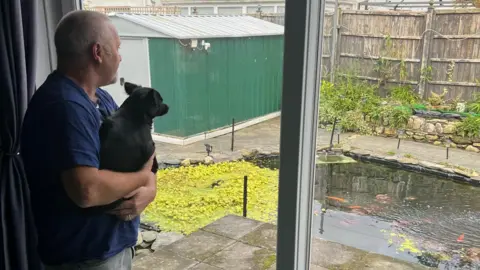 NIGE COOPER
NIGE COOPERBack in Ulverston, Nige said he was "doing everything he could" to protect both his pond and the otters, but he was worried harm may come to them.
For now, all he and his diligent dogs can do is hope the otters return to the waterways and their environment improves.
Follow BBC Cumbria on X, Facebook, Nextdoor and Instagram. Send your story ideas to [email protected].
